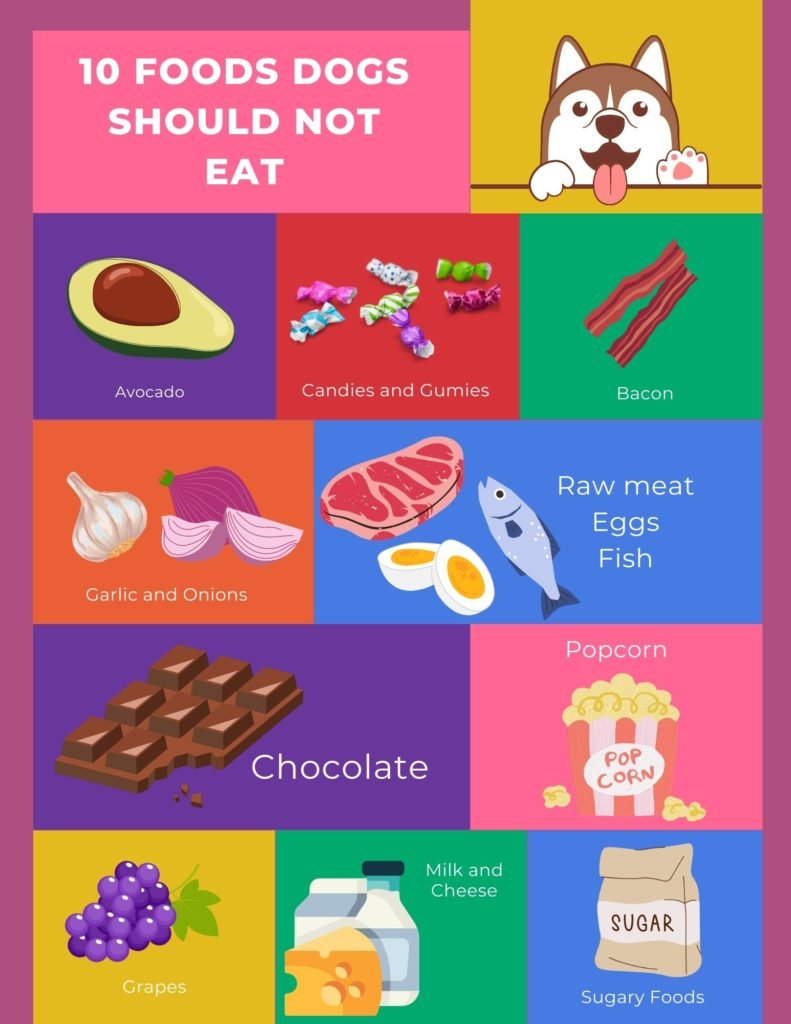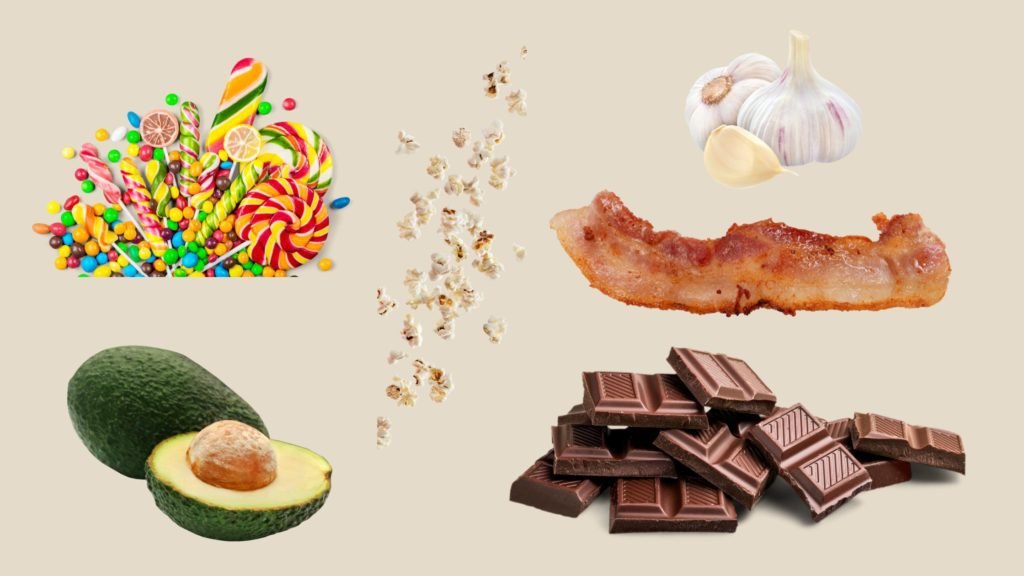10 Foods Dogs Should Not Eat: Discover the top 10 dangerous and toxic foods you should never give your dog. The most effective method to train your dog is to know when to say “no” and when to provide healthy alternatives in the appropriate proportion. Even if your dog begs you, you should not offer such food since it harms your beloved friend’s health. Are you interested in finding out which ones they are?
Bacon
The smell of bacon is their weakness, yes… But hold on because fatty foods like bacon or ham can cause pancreatitis in dogs. And due to the high salt content, they can also cause stomach discomfort. Another consequence that their consumption can cause in dogs is that they get very thirsty, drink a lot of water, and which causes swelling. So no bacon, even if there is a barbecue!
You May Also Interest: Indigestion in Dogs: Is your dog’s stomach making them miserable?
Candies, gummies and baked goods
The real culprit in sweets is xylitol, which causes a surge in insulin that can lead to low blood sugar and liver failure. Symptoms include lethargy, vomiting, loss of coordination, and seizures. So before giving your dog any of these products, always check the ingredient list for xylitol.

Raw meat, fish, and eggs
Wolves eat fresh meat, so your dog can take some raw meat, right? Wrong! Raw meat contains bacteria that can lead to poisoning, and raw fish can hide parasites that cause fatal diseases. Raw eggs may contain salmonella or E. Coli, an enzyme that can cause skin problems. Cooking is an excellent way to kill bacteria and parasites that harm your hairy friend. And there is nothing like a home-cooked meal!
Garlic and onions
Continue with the list of foods dogs should not eat this combo can end up with a dog’s red blood cells, leading to anemia. That is complicated because a small dose can only do a little harm. However, a hefty dose or small regular doses can lead to poisoning. Symptoms may include weakness, vomiting, difficulty breathing, and loss of appetite. So garlic for vampires!
Chocolate
Heading the list of foods not recommended for dogs is chocolate. Theobromine is a substance that is not harmful to humans, but it is considered the toxic part of chocolate for dogs. It is found in all types of chocolate. It can cause a dog to vomit, have diarrhea and feel dehydrated. In extreme cases, it can cause abnormal heart rhythms, seizures, tremors, or even death. However, some animal lovers have already thought of a way to sweeten life for dogs, and here is this healthy option for your hairy one.
You May Also Interest: Don’t Ignore Your Dog’s Dental Health: Here’s How to Clean Their Teeth
Avocado
Not only are avocado bones a choking hazard for your dog, but they also contain persin in their leaves, seeds, bark, and fruit. If you have an avocado plant at home, make sure your best friend cannot access it. Persin is not harmful to humans but is toxic in large amounts for dogs. Leave the guacamole for yourself and offer your dog a special pizza for dogs if you have a party.
Grapes and raisins
This type of food goes unnoticed among potentially dangerous foods because they are supposedly healthy. But grapes and raisins cause kidney failure in dogs. The kidneys may start to shut down, causing vomiting and a lot of fatigue. It is best to keep grapes and raisins out of your dog’s reach.
Popcorn
The good news is that popcorn is only bad if it is salty. Salt can cause common salt poisoning, not to mention excessive thirst or uncontrolled urination. Symptoms of overeating salt may include vomiting, diarrhea, fever, and seizures. Salt can be fatal, so keep it to a minimum in the foods you offer your furry one.
Sugary foods
If salt is not good, sugary food is not either, not for humans or for dogs. They can suffer similar problems to ours. Obesity, dental health problems, and diabetes can result from overeating sugary foods. Do not give your dog sugar, and consider how to stop yourself too!
You May Also Interest: Worms in Dogs: A Common, But Often Overlooked Threat
Milk, cheese, ice cream, and other dairy products
Ending with the list of foods dogs should not eat is the lacteous products. Giving your dog a piece of cheese while cooking is daily, but you should know that your dog is not made to process cow’s milk derivatives. In addition, many dogs are intolerant to lactose. Dairy products can cause dogs to vomit, have diarrhea or develop gastrointestinal diseases. The high-fat content can lead to pancreatitis, as in the case of fatty meats.
Finally, it is essential to be aware of the hazards of specific meals for your dog. While it may be tempting to feed your dog something from your plate, keep in mind that some human foods can be toxic or even fatal to dogs. You may assist in safeguarding your dog’s health and well-being by avoiding the ten foods listed above. Before feeding your dog any new food, consult a veterinarian or conduct extensive research to confirm that it is safe for them to consume. By being cautious of what you feed your dog, you can help guarantee that they live a long and healthy life.

